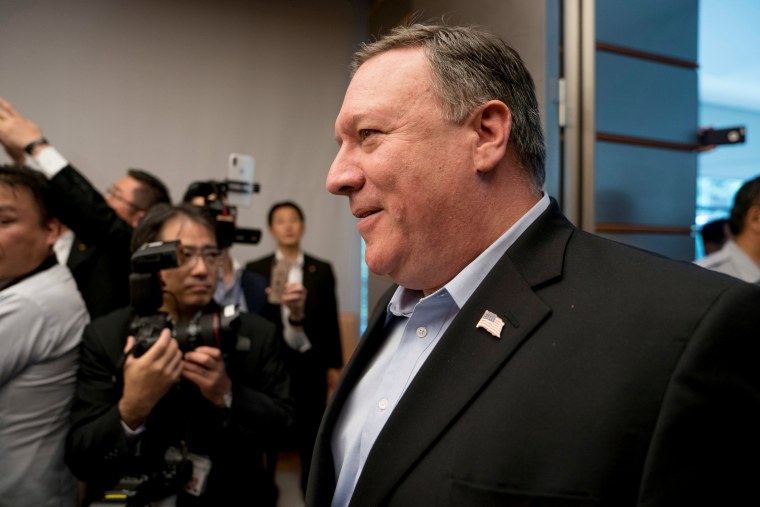TOKYO — U.S. Secretary of State Mike Pompeo on Sunday brushed aside North Korea's accusation of "gangster-like" demands, maintaining that his third visit to the country was producing results but vowing that sanctions would remain until Pyongyang follows through on leader Kim Jong Un's pledge to get rid of his nuclear weapons.
Pompeo downplayed North Korea's statement after the talks in which the country's foreign ministry bashed hopes for a quick deal and accused the U.S. of making "gangster-like" demands aimed at forcing it to abandon nuclear weapons.
The North's statement, coming so soon after Pompeo's trip, was sure to fuel growing skepticism in the U.S. over how serious Kim is about giving up his nuclear arsenal.
"If those requests were gangster-like, the world is a gangster," Pompeo said, noting that numerous U.N. Security Council resolutions have demanded that the North rid itself of nuclear weapons and end its ballistic missile program.
"People are going to make stray comments after meetings," Pompeo said. "If I paid attention to the press, I'd go nuts."
Speaking after meeting with his Japanese and South Korean counterparts in Tokyo, Pompeo said his two days of talks in Pyongyang had been productive and conducted in good faith. But following the stinging commentary from the North, he allowed that the goal of denuclearization would be difficult and that much work remains.
"The road ahead will be difficult and challenging and we know critics will try to minimize what we have achieved," he said. Two days of talks with senior North Korean officials had "made progress," he said, and included a "detailed and substantive discussion about the next steps."
Those include the formation of working group to determine exactly how North Korea's denuclearization will be verified and a Thursday meeting with Pentagon officials to discuss the return of remains of Americans soldiers killed during the Korean War.
Pompeo sought to dispel suggestions that the Trump administration has backed down from demanding the complete, verifiable and irreversible dismantlement of the North's nuclear weapons. He said North Korea understood that denuclearization must be "complete" and "verified."
However, Pompeo said the progress achieved thus far did not warrant any concessions. "While we are encouraged by the progress of these talks, progress alone does not justify the easing of the sanctions regime," he said.
"Sanctions will remain in place until final fully verified denuclearization as agreed to by Chairman Kim Jong Un has occurred," he said.
After the historic U.S.-North Korea summit in Singapore, President Donald Trump declared the North was no longer a threat and would hand over the remains of American soldiers. Yet three weeks later, the two sides were still divided on all the issues, including exactly what denuclearization means and how it might be verified. And, the promised remains have yet to be delivered.
Just hours after Pompeo arrived in Tokyo, the North blasted the discussions, saying the visit had been "regrettable."
In a statement carried by the North's official Korean Central News Agency, the foreign ministry said the outcome of Pompeo's talks with senior official Kim Yong Chol was "very concerning" because it has led to a "dangerous phase that might rattle our willingness for denuclearization that had been firm."
"We had expected that the U.S. side would offer constructive measures that would help build trust based on the spirit of the leaders' summit ... we were also thinking about providing reciprocal measures," it said. "However, the attitude and stance the United States showed in the first high-level meeting (between the countries) was no doubt regrettable. Our expectations and hopes were so naive it could be called foolish."
It said the North had raised the issue of formally ending the Korean War, which concluded with an armistice and not a peace treaty, but the U.S. came up with a variety of "conditions and excuses" to delay a declaration. It downplayed the significance of the United States suspending its military exercises with South Korea, something trumpeted by Trump after the summit as a success, by saying it made a larger concession by blowing up the tunnels at a nuclear test site.
In criticizing the talks with Pompeo, however, it carefully avoided attacking Trump personally, saying "we wholly maintain our trust toward President Trump," but stressed that Washington must not allow "headwinds" against the "wills of the leaders."
That appeared to be a reference to Trump's national security adviser John Bolton, a prominent North Korea hawk who has been vilified by Pyongyang in the past. Pompeo spoke with Trump, Bolton and White House chief of staff John Kelly on Saturday before his second round of meetings with Kim Yong Chol.
A former top U.S. diplomat for Asia, Daniel Russel, said the setback was to be expected and warned Trump he is engaged in a long negotiation that would not produce easy quick, made for television results that the president likely wants.
"Dealing with North Korea is hard because Kim Jong Un wants it to be hard," said Russel, who was assistant secretary of state for East Asian and Pacific Affairs in the Obama administration. "If you make the Americans fight for every inch, the Americans will start measuring progress in inches — and will wind up paying by the inch. At this point, even to get the North Koreans to follow through with the return of Korean War-era MIA remains, would feel like a big win for Pompeo, even though it wouldn't affect the nuclear threat."
"Kim can afford to play hardball because it's clear to him that Trump, who has already told Americans they can sleep soundly because the threat is now over, badly wants a deal," Russel said. "And when you want it bad, you get it bad. Why should the North Koreans make concessions to one of Trump's aides given the president's record of undercutting them?"

